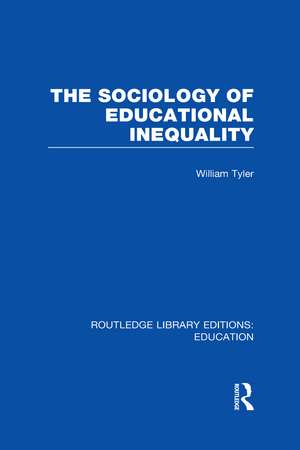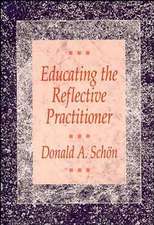The Sociology of Educational Inequality (RLE Edu L): Routledge Library Editions: Education
Autor William Tyleren Limba Engleză Hardback – 8 dec 2011
Din seria Routledge Library Editions: Education
-
 Preț: 379.00 lei
Preț: 379.00 lei -
 Preț: 377.09 lei
Preț: 377.09 lei - 8%
 Preț: 375.32 lei
Preț: 375.32 lei -
 Preț: 401.28 lei
Preț: 401.28 lei -
 Preț: 400.93 lei
Preț: 400.93 lei -
 Preț: 566.49 lei
Preț: 566.49 lei -
 Preț: 379.48 lei
Preț: 379.48 lei - 18%
 Preț: 1298.07 lei
Preț: 1298.07 lei -
 Preț: 641.88 lei
Preț: 641.88 lei - 34%
 Preț: 819.90 lei
Preț: 819.90 lei - 26%
 Preț: 247.40 lei
Preț: 247.40 lei - 34%
 Preț: 819.90 lei
Preț: 819.90 lei - 34%
 Preț: 819.90 lei
Preț: 819.90 lei - 34%
 Preț: 991.00 lei
Preț: 991.00 lei - 34%
 Preț: 822.76 lei
Preț: 822.76 lei - 34%
 Preț: 821.53 lei
Preț: 821.53 lei - 26%
 Preț: 259.98 lei
Preț: 259.98 lei - 34%
 Preț: 764.20 lei
Preț: 764.20 lei - 34%
 Preț: 819.90 lei
Preț: 819.90 lei - 34%
 Preț: 819.90 lei
Preț: 819.90 lei - 34%
 Preț: 761.85 lei
Preț: 761.85 lei - 34%
 Preț: 986.91 lei
Preț: 986.91 lei - 55%
 Preț: 541.50 lei
Preț: 541.50 lei - 34%
 Preț: 762.01 lei
Preț: 762.01 lei - 25%
 Preț: 261.37 lei
Preț: 261.37 lei - 34%
 Preț: 762.97 lei
Preț: 762.97 lei - 34%
 Preț: 819.90 lei
Preț: 819.90 lei - 34%
 Preț: 986.91 lei
Preț: 986.91 lei - 34%
 Preț: 821.53 lei
Preț: 821.53 lei - 34%
 Preț: 819.90 lei
Preț: 819.90 lei - 34%
 Preț: 819.90 lei
Preț: 819.90 lei - 34%
 Preț: 821.13 lei
Preț: 821.13 lei - 34%
 Preț: 2100.27 lei
Preț: 2100.27 lei - 34%
 Preț: 819.90 lei
Preț: 819.90 lei - 34%
 Preț: 819.90 lei
Preț: 819.90 lei - 34%
 Preț: 764.20 lei
Preț: 764.20 lei - 34%
 Preț: 819.90 lei
Preț: 819.90 lei - 34%
 Preț: 986.91 lei
Preț: 986.91 lei - 34%
 Preț: 764.20 lei
Preț: 764.20 lei - 34%
 Preț: 819.90 lei
Preț: 819.90 lei - 34%
 Preț: 4048.76 lei
Preț: 4048.76 lei - 34%
 Preț: 736.38 lei
Preț: 736.38 lei - 34%
 Preț: 819.90 lei
Preț: 819.90 lei - 34%
 Preț: 764.20 lei
Preț: 764.20 lei - 34%
 Preț: 821.53 lei
Preț: 821.53 lei - 34%
 Preț: 819.90 lei
Preț: 819.90 lei - 34%
 Preț: 819.90 lei
Preț: 819.90 lei - 34%
 Preț: 819.90 lei
Preț: 819.90 lei
Preț: 764.20 lei
Preț vechi: 1154.58 lei
-34% Nou
Puncte Express: 1146
Preț estimativ în valută:
146.35€ • 149.34$ • 123.13£
146.35€ • 149.34$ • 123.13£
Carte tipărită la comandă
Livrare economică 26 februarie-12 martie
Preluare comenzi: 021 569.72.76
Specificații
ISBN-13: 9780415505970
ISBN-10: 0415505976
Pagini: 146
Dimensiuni: 156 x 234 mm
Greutate: 0.45 kg
Ediția:1
Editura: Taylor & Francis
Colecția Routledge
Seria Routledge Library Editions: Education
Locul publicării:Oxford, United Kingdom
ISBN-10: 0415505976
Pagini: 146
Dimensiuni: 156 x 234 mm
Greutate: 0.45 kg
Ediția:1
Editura: Taylor & Francis
Colecția Routledge
Seria Routledge Library Editions: Education
Locul publicării:Oxford, United Kingdom
Public țintă
General, Postgraduate, Professional, and UndergraduateCuprins
Editor’s Introduction. 1. The Causal Structure of Educational Inequality. 2. Education and Jobs – the ‘tightening bond’ examined. 3. The School Environment: Does it Matter? 4. Genetics and Inequality: The IQ Debate. 5. Social Background and Attainment. 6. Fairness and Merit: A Reappraisal of Educational Policy. References and Indices.
Descriere
What is the most significant factor for explaining why some individuals are more successful than others – genetic inheritance, privileged background or luck? Although conventional approaches stress the prime importance of one of these, Tyler argues that such theories fail to deal adequately with the complexity of educational inequality and suggests that Boudon’s model of opportunity and mobility would provide us with a more productive explanation. By applying this model to post-war British education he shows how we might effectively think our approaches to the ‘cycle of deprivation’, comprehensive reform and educational spending.














